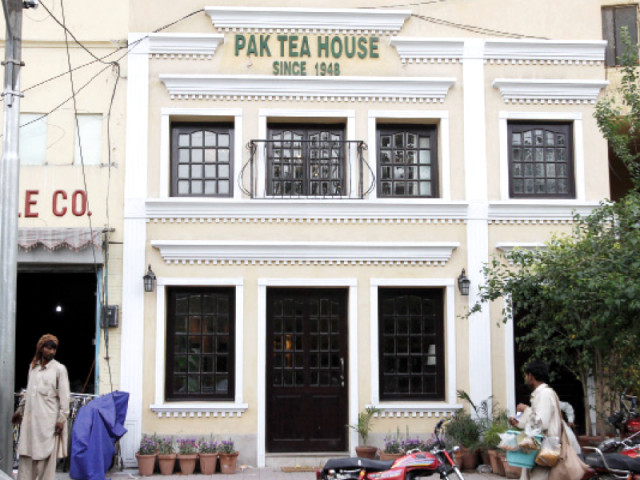Pak Tea House: Regulars of the past visit the present
Reminisce about the ‘golden days’, pin hopes on authors of today to carry the tradition forward.

Reminisce about the ‘golden days’, pin hopes on authors of today to carry the tradition forward. PHOTO: SHAFIQ MALIK/EXPRESS
Following the reopening of Pak Tea House, after more than 12 years of closure, regular customers of the past were among the first ones to visit the place. Despite “all that has changed”, some of them plan to frequent the place.
Among them are poet-journalist Nasir Zaidi, writer Kanwal Feroze and critic Dr Amjad Tufail.
On Friday afternoon as they sipped tea, they shared with The Express Tribune, their memories of the place, their impressions about how it has been redone, their fears and their thoughts on the waiters and the food being served at the Tea House. Zaidi and Feroze, both in their 70s, started visiting the Pak Tea House in 1955 and 1960 respectively. They miss the old staff that used to know them. “These [new] waiters do not know who we are,” remarked Zaidi.
Dr Feroze, a Tamgha-i-Imtiaz recipient, remembers a waiter named Elahi Bakhsh, fondly called ‘Colonel’ Elahi Bakhsh by the regulars. Bakhsh used to know everybody who visited the Tea House frequently.
“Bakhsh used to interact with all the writers and poets,” Dr Tufail chips in. The ‘Colonel’ did not shake anyone’s hand for several days after he shook hands with Zulfikar Ali Bhutto when he visited the Pak Tea House, he tells The Express Tribune. “These [new] waiters,” he says, “don’t even make an effort to know us.”
Zaidi also does not approve of the choice of portraits put up around the Tea House. He says “only the rich and famous” appear to have made their way on to the wall and “not the ones who made the place what it was”. “Faiz Ahmad Faiz should not be the only person we want to remember,” he remarks, referring to more than one portrait of the poet.
He lists Saif Zulfiqar, Aziz Asri, Dr Saleem Wahid Saleem, Younis Adeeb, Iqbal Sajid, Zaheer Kashmiri and Saleem Shahid as people whose pictures should have been on the walls. Several people whose pictures are on the walls, he says, were not even regular visitors.
Zaidi remembers that the place was popular for its champaain (mutton chops). “It was never a popular place for tea,” he says. He adds he was surprised to hear Nawaz Sharif say that he used to come to the Tea House during his Government College days for tea. “Lords and Shehzan [on The Mall] were the popular tea places,” he says.
Zaidi also misses the variety and quality of food that was served at the ‘old’ Tea House. Despite spending so much on renovation (Rs8.5 million according to the city government), the place has no gas connection, he comments.
In his opinion, the new menu doesn’t offer much. He also thinks it is expensive. Zaidi thinks the high prices and lack of variety may be a reason for the Tea House’s failure to establish itself as a place frequented by writers. This, he fears, might turn the place into a sheesha cafe – a place for the younger people to hang out at – rather than a hub for writers. Zaidi also says the city government should introduce cards at the tea house, which distinguish between ‘intellectuals’ and ‘visitors’.
Dr Feroze doesn’t think the Tea House will, once again, become a hub for intellectuals “because no one wants [these days] to get to know other people”. Without getting to know each other, there is little chance of starting a debate, he reasons.
Manzoor Ahmad Ravi, a Karachiite and a regular in the past, shares the sentiment. Now in his 60s, he used to visit the place every other week in the 1970s during his frequent visits to Lahore. It has been years since the occasional poet had the chance to share his work with people like Habib Jalib, Faiz Ahmad Faiz and Ahmad Nadeem Qasmi and get their feedback. What disturbs him is the “egos that people seem to have developed”. “People used to share a table. [If you are sitting at a table today, no one will come sit with you] and no one is comfortable with a ‘stranger’ sitting with them,” he says.
Among the others who visited the Tea House on Friday are Neelam Ahmad Bashir, a writer who is the daughter of Ahmad Bashir.
Accompanying Bashir is Sohaina Elia, the daughter of Urdu poet Jaun Elia and journalist-turned-writer Zahida Hena. Elia, a painter, is visiting the Tea House for the first time and hopes it will revive the ‘culture of healthy gatherings’.
Baber Najmi, a Punjabi poet and another old customer, is happy that he has, once again, a “decent place where he can sit and think in peace”. Najmi remembers his chats with Akhtar Lahori (Punjabi poet), Israr Zaidi and Manzoor Wazirabadi. He, too, has pinned hopes on contemporary authors and poets to breathe life back into the Tea House. “Intellectuals are a reflection of their society. They are the only people at large who think about the people, unlike others who only think about personal gains,” he says.
Published in The Express Tribune, April 7th, 2013.



















COMMENTS
Comments are moderated and generally will be posted if they are on-topic and not abusive.
For more information, please see our Comments FAQ